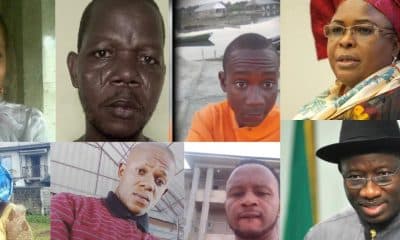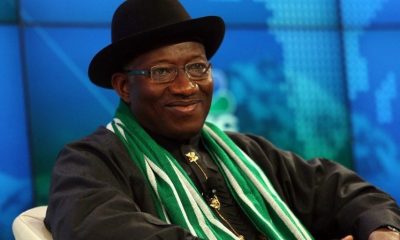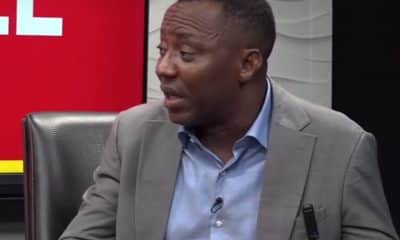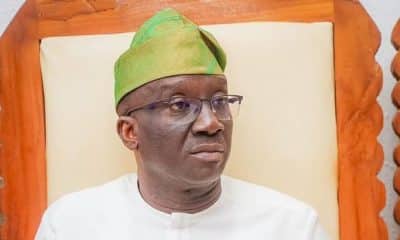Opinion
Goodluck Jonathan: Anything And Nothing Are Possible

In Nigeria, saying something is “impossible!” is risking being stranded on the island of reality. This time eight years ago, a section of the country badly wanted the mediocre administration of Dr Goodluck Jonathan gone. It seemed impossible, but it happened. Depending on how the odds align, Jonathan may return to Aso Rock again. That will not only mean we would have spent eight years running only to arrive at the same spot from where we started, but also that nothing that resembles social advancement seems possible in Nigeria.
Since the possibility of Jonathan’s second coming started looming, most critics have denounced the move. From pearl-clutching to handwringing, apologetics, and even some reasonable advice for Jonathan not to disgrace himself by aligning with the “enemy” camp, they have said it all. Yes, it is frustrating how our politics never seems to move us past the same band of people.
First, I am aware that Jonathan’s media aide has refuted any claim that he has committed to running the presidential race. At the time of writing this, his membership of the ruling All Progressives Congress has not been formally confirmed either. Still, the fact that he did not firmly announce that he is uninterested in running, or has no plans to ever be on the APC platform, means his potential candidature in that party is within the realm of possibility. I am sure Jonathan is aware that his candidature is merely to undercut other southern Nigeria candidates, but so what? The Nigerian political class has no tribe (or religion). It is a fraternity of calculative hopefuls playing different cards while manipulating the emotionally unintelligent. I also believe Jonathan knows that his presidency will amount to merely filling the calendar gap between 2023 and 2027 but, then, this is also Nigeria. There is not much else to our political process outside jockeying for power and the ultimate access to resources. For a man whose political trajectory has been the good luck of being in the right place at the right time, the myth of his name might even work for him all over again.
Second, I suspect Jonathan himself privately regretted handing over power in 2015. He probably assumed that walking away from the presidency with his head high would institute the norms of democracy and put his name on the right shelf of history. In Africa, where leaders habitually sit tight in office and a peaceful change of power between different political parties is still relatively rare, he must have imagined he was doing something worthwhile. The past seven years must have shown him how much he miscalculated and that his gentlemanly conduct was wasted on a political class who have no concept of honour. Part of the fear then was also that if he contested the result of that election, the country would descend into another round of benumbing violence, worse than what retired Major General Muhammadu Buhari’s followers instigated in 2011. In retrospect, the violence and insecurity that presently bedevil the country because of Buhari’s legendary incompetence are sadder than what our fate might have been in 2015.
Worse still, as fierce and polarising as that election was, it was not even a change from the status quo. Other than wearing a different costume, those who replaced the Jonathan administration were the same old clowns. Apart from Jonathan himself, almost everybody of note that used to be in the Peoples Democratic Party is now in the APC. The ones remaining in PDP will defect in an instant if it guarantees their continuity in power. Once they succeed in officially bringing GEJ to their camp, we can at least be free of the illusion that we run a multi-party democracy. There will be no more beating us on the head with “16 years of the PDP.” We can describe our political history as “24 years of the same menace—and still counting!” We can also stop labouring under the delusion that our politics—as presently construed—can deliver anything more than serial failures. Nigerian politics is merely a means by which people make enough money in order to contest another election.
When I think of Jonathan in APC and his potential candidacy as president, I wonder about the factions of supporters in 2015. What level of cognitive dissonance are they struggling with now? That was an election where people’s electoral choices were divided, not just into the standard religious and/or tribal camps, but also along the fault lines of moral indignation. Each side jostled to determine whose respective partisanship was the more patriotic strain. By the end of the election cycle, the sentiments culminated in a disaffection that reverberated through our existing crisis of national identity.
If Buhari were a leader with the prudence necessary to manage a diverse and complex country like Nigeria, he should have mopped up the high emotionalism that followed that election to heal the wounds. Unfortunately, he is the kind of old man whose elderliness upsets—rather than sustain— a homestead. Part of the fallout of his gross lack of sagacity is the ongoing crisis in the South-East. The rest of the country is no better either. Every corner of Nigeria has been diminished under Buhari’s ineffectual watch. Imagine enduring all that pain and punishment only to face the possibility of Jonathan’s second coming? The hardest part to bear is that none of the faith some of us have invested in Nigeria seems to be bearing out. We are being made to circle the same mountain like an accursed people.
It is almost pointless to litigate whether Jonathan should run for president or not even though it is glaring that his candidacy is a ploy to mark the time between two elections. The real problem is almost too trite but here it is for free: as things stand right now, there is no real path to national development and social transformation. Our politics is nothing more than a routine power grab. The Nigerian political system is too broken, our institutions too corrupted and our leadership system too ethically compromised to produce anything different from the band of jesters currently parading themselves as potential leadership materials.
Nigeria is on the march again but it is evident that the quadrennial cycle of electing, de-electing, and re-electing the same jokers is not that path towards social development. More than 40 people are currently bidding for the presidency and hardly one represents that (wo)man of vision who can instigate serious political and economic reforms to stop the habits of retrogression that ties down Nigeria’s destiny. One only needs to listen to what they are promising to see that there is no thought or drive towards leadership. They are more of the same nothing. Anyone who has ever witnessed a debate among politicians claiming to belong to different political parties would have long concluded that Nigeria does not even have partisan politics in the true sense. There is no black or white, no left or right. If the price is right, all the politicians will agree and disagree on the same thing. Beyond gaining closer access to federal allocation, no ideology or strategy defines their actions. While in their respective offices, they do not even try to initiate governance or make even a modest attempt at administration.
That the party of “anti-corruption” that pursued Jonathan out of office while promising to stop the country from haemorrhaging can still field him again eight years after if it aligns with their political arithmetic shows that anything is possible. The irony cannot be lost on the political establishment too, and most likely, they self-justify by reasoning that they did not put a gun to our heads and make us buy their farce. We used our own hands to vote for it. The very idea that we might go full circle from Jonathan to Buhari and back to Jonathan is a setback. Part of the effect will be the cynicism that nothing is, in fact, possible. We are merely running on the same spot and the best our politics achieves is taking us through the motions of progress.
Abimbola Adunni Adelakun is a Nigerian writer and an assistant professor in the Department of African/African Diaspora Studies at the University of Texas.












